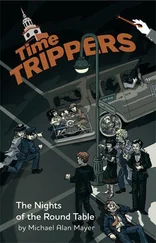“That,” Tanz declared approvingly, “is what I call true national awareness—something really worth fighting for.”
“I don’t wish to exaggerate my own importance.” Von Seydlitz-Gabler spoke with unaffected simplicity. “We’ve been through some hard times, but what are hard times for, if not to teach us the art of survival? Conscientious objectors and pacifists are as good as dead today. They can say and write what they please, but they’re not socially acceptable.”
“It’s much the same over there—where I come from,” said Tanz, looking thoughtful.
Von Seydlitz-Gabler’s voice took on a note of justifiable pride. “You’ll see how far the country has travelled back along the road to sanity when I tell you that people not only listen to old soldiers like us but actually seek our advice. For instance, they’ve snapped up these memoirs of mine. Negotiations for an English edition are complete and a big American magazine is bidding for the pre-publication rights.”
“Splendid news,” Tanz said appreciatively. “That’s the sort of air a man can breathe in. I congratulate you. No one deserves success more than you.”
“Of course, I’m not telling you this just to blow my own trumpet. I merely quote it as an illustration of how things are with us. There’s only one sphere of operations for men with ideas, and I hope you’ll have decided by now which side of the border it’s on. Tell me in all honesty, my dear fellow, wouldn’t you like to join us?”
Tanz, who had been sitting there stiff as a poker but with his body slightly inclined, now drew himself up to his full height. His granite features seemed to be illumined by a gentle ray of sunlight. “My sense of duty comes first,” he said, punching out the words like a machine, “but it must be a spontaneous sense of duty. To me, service is not an end in itself. It must have a higher purpose.”
“Does that mean you’ve already decided to make the break?” von Seydlitz-Gabler asked expectantly.
“I’m not averse to the idea—given some guarantee of fair treatment.”
“How wonderful!” Frau Wilhelmine laid her hand affectionately over Tanz’s. “I know you’ll feel at home with us. We have a wide circle of friends and our social functions are regaining their old cachet. Even cabinet ministers feel honoured to be invited.”
“And so they should!” cried von Seydlitz-Gabler in high good humour. “But you will be especially welcome, my dear Tanz. There are any number of possibilities open to you. You can relax in private, or do a bit of writing for the papers, or go into industry with our friend Kahlenberge’s assistance, or write memoranda for government departments, or become a military consultant, or even return to the active list again—the choice is unlimited.”
Tanz nodded curtly. “My motto has always been deeds rather than words, as you know. The last thing I want is to draw attention to myself.”
“Your wishes shall be respected, rely on me. This evening, subject to your approval, we plan to give a small private reception. Only eight or ten people—a dozen at the most-including men with influence in the right quarters, friend Kahlenberge among them. You’ll be able to explore the ground—entirely without obligation, of course. What do you say?”
“I shall be glad to come,” said Tanz. He sounded almost moved. The glass which he was holding shattered between his clenched fingers and blood started to drip from his palm, but he appeared not to notice. With formal courtesy, he added: “I’m greatly indebted to you.”
INTERIM REPORT
FURTHER DOCUMENTS, INCLUDING EXTRACTS FROM MANUSCRIPTS, TELEPHONE CONVERSATIONS AND LETTERS
The following are excerpts from the draft of the lecture which Kahlenberge planned to give before an invited audience in Berlin: “…it is my intention, so far from putting the concept of soldiership on a par with that of war, to make a deliberate distinction between the two. If you train a man for war alone you are automatically training him for murder; but if you claim, in all sincerity, that you are training him to preserve peace you must train him to be a human being. You have no other choice.
“To train a man in blind obedience is tantamount to fostering stupidity. It may be the most convenient form of man-management, but it has nothing whatsoever to do with leadership. An attempt to inculcate culture and knowledge, on the other hand, presupposes culture and knowledge on the part of the teacher. Building up an army must be a mental process, not a piece of routine planning. An army should not be in the hands of adroit power politicians but in those of equally shrewd but responsible men.
“If the course of history conforms to any so-called historical rules, then we have reached the end of the road. If it means learning and experience, then we must finally acknowledge the necessity—the vital necessity—or making a radical break with the past. As long as the soldier is only a fighter, a warrior, a recipient of orders, a gunman and a potential murderer, he will always be at the mercy of bloodthirsty and unscrupulous war-mongers…”
These remarks had been heavily deleted in red pencil. The same pencil had written in the margin: “Too late!” but the exclamation mark after the words had been replaced by a mark of interrogation.
Extracts from a letter written by Frau Wilhelmine von Seydlitz-Gabler to her sister-in-law, whose husband, Frau Wilhelmine’s brother, was head of a government department: “… I’m sure you still remember General Tanz. I told you so much about him. You know I never enthuse about people, but I’ve always had a soft spot for General Tanz. He’s a man of action—perhaps the last of his kind. If only he would take Ulrike off my hands. I’m so worried about her.
“…Fate sent General Tanz to the East. He made every effort to do his duty even there, and he succeeded. What a price he paid, though! You can see it in his face.
“…He has boundless faith in Herbert—and in me as well. If ever a man followed the dictates of his conscience, it is he. Do tell Adalbert about him. Something definite must be done. It’s none of my affair, but when I think what those Russians have done…”
Verbatim notes of a telephone conversation between Detective-Sergeant Hornträger of Dresden:
Liebig: “I’ve come across an interesting memo in my files—something of yours. I gather you found some witnesses who saw a saloon car parked in a side street near the scene of the crime.”
Hornträger: “That’s right, sir. It was there for some time.”
Liebig: “Well, did you follow the information up?”
Hornträger: “Of course—as far as it seemed necessary. The driver was a chap called Wyzolla—a sergeant in the National People’s Army.”
Liebig: “Go on.”
Hornträger: “Well, nothing came of it—at least, nothing that seemed to have any bearing on the case. I naturally made the usual routine inquiries, discreetly, of course. His superiors had nothing but good to say about him. They gave him an excellent report. He turned out to be the G.O.C.’s personal driver.”
Liebig: “Damnation! What’s the G.O.C.’s name?”
Hornträger: “Tanz.”
Liebig: “That settles it. I want you to interrogate Wyzolla at once—no holds barred, mind you. Squeeze him like a lemon and don’t worry about the consequences. Keep a mobile squad on call and ’phone me as soon as you’ve got something to report. I’ll wait for your call here.”
From the memoirs of General von Seydlitz-Gabler. The following passage is taken from a chapter entitled “The Path of Duty": “There were certain problems which I, personally, never evaded. I say this not out of vanity but as a matter of plain fact. I always strove to be a father to my men and never contemplated surrendering to Corporal Hitler. In that way, I not only helped my men to lead a comparatively worthy existence but also managed to protect many of them from the more unpleasant aspects of our situation. By refusing to desert my post I was serving the future of Germany.
Читать дальше












